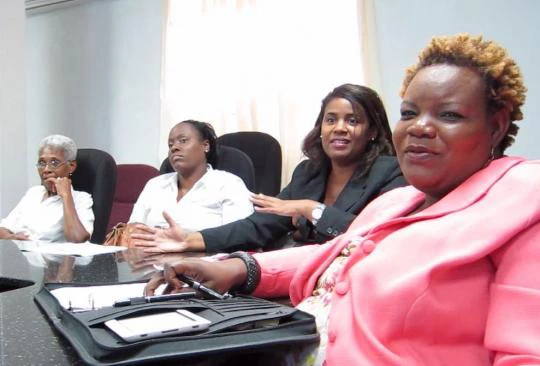Women entrepreneurs in the Caribbean are breaking through the walls (Credit: infoDev)
In the last few decades, women in the Caribbean have made impressive strides to break through the glass ceiling and obtain positions of power and responsibility. In governments throughout the region, we’ve seen women as national leaders including Janet Jagen (Guyana), Eugenia Charles (Dominica), Portia Simpson Miller (Jamaica) and Kamla Persad-Bissessar (Trinidad). In addition, the region’s women are attaining high levels of academic achievement, and now there are more female than male college graduates in total. While this is all extremely positive news for gender equality in the Caribbean, we shouldn’t rest on our laurels just yet. There is still one area of the playing field that remains to be leveled, and not just in the Caribbean, which is women succeeding as well as men as high growth entrepreneurs.
Lesa Mitchell of the Kauffman Foundation explains that although women have risen to the top in many technology-oriented corporate and university systems, they have not yet reached these heights in entrepreneurship. She blames glass walls, rather than ceilings, that hold women back from breaking out laterally, and starting something big on their own.
infoDev, a global innovation program in the World Bank, has seen this first hand in the countries where we work, with low participation of women entrepreneurs in our incubators, workshops and innovation labs. While this is due to a number of reasons, specific to circumstances in each case, research points to a lack of business connections and networks, few entrepreneurial female role models, and concern that running a startup means an uncompromising work/life balance with no time for family. Accessing finance is also a challenge, with women often lacking the required collateral to obtain successful financing above the microfinance level from banks. A 2011 study by the IFC found that across Africa, Asia, and Latin America, an average of 35-43 % of women-owned SMEs are unserved (i.e. do not have a loan, but need one), while 20 - 24 % are underserved (i.e. have a loan, but face financing constraints). Therefore, infoDev is taking steps to address these challenges.
infoDev’s Entrepreneurship Program for Innovation in the Caribbean (EPIC) to support entrepreneurs scaling their businesses across the region, thereby bolstering local economies. As part of this program, the Women Innovators Network in the Caribbean is being set up to ensure that growth-oriented female entrepreneurs can grow their businesses and be successful. High growth SMEs are the ones that create the most jobs and impact on economies. According to the U.S. Census Bureau, most net jobs created in the US from startups in their first year of operation. Therefore, ensuring that Caribbean women entrepreneurs can grow and contribute to job creation, is not only a step in the right direction towards gender equality, but also a necessity for EPIC to achieve its goals.
So who are these Caribbean women entrepreneurs? We held a competition in March through the Women Innovators Network to identify the most innovative women entrepreneurs in the Caribbean with the prize of participating in infoDev’s 5th Global Forum on Innovation and Technology Entrepreneurship in East London, South Africa. The response was impressive, with over 70 applications from 13 countries spanning the entire region. The applications gave a snapshot of women entrepreneurs throughout the region – where they are, what sectors they’re working in, what are their plans for scaling their businesses, and their own personal stories.
Most of the applicants worked in professional, scientific and technical activities (21%), followed by manufacturing (18%) and administrative and support services (18%). 11% work in ICT. Almost 50% of them were already exporting, 80% of which to two or more countries. This snapshot demonstrates that there are indeed women entrepreneurs in the Caribbean who consider themselves growth oriented, who are not working in traditional livelihood business or subsistence sectors. There were in fact so many impressive applications, that four businesswomen, rather than two, as originally planned, were selected as winners: Racquel Goddard, Sharleen Chin, Fern Foster and Tiffany Simpson.
Racquel Goddard, who works in the IT sector, was also a speaker at the African Women Entrepreneurs Roundtable at the Global Forum. She plans to set up the Caribbean’s first home-grown Fortune 500 technology company with iDaedle, an idea exchange marketplace where consumers provide their ideas to specific companies or industries. She’s making good headway towards her goal having already engaged large clients such as Lime, the Government of Jamaica and Burger King. At the Global Forum she met potential business partners, and even signed up with Idea Capitalist, a global product and services Commercialization Company. All in all she says the experience changed her life.
Having worked in the male‐dominated IT corporate world before, and recognizing the importance of collaboration and networks, Racquel has already set about creating a consortium of female entrepreneurs who meet once a month back home in Jamaica, to support each other, share ideas and collaborate on projects. Having access to the right networks of peers, mentors, business advisors, investors and technical specialists, is one of the key aspects to furthering women’s participation in high growth entrepreneurship. The Women Innovators Network will seek to provide access to these networks, to support women entrepreneurs as they bring those glass walls smashing down.



Join the Conversation